Unit 2How often do you exercise? Section B (2a~2e)课件(共24张PPT)
文档属性
| 名称 | Unit 2How often do you exercise? Section B (2a~2e)课件(共24张PPT) |
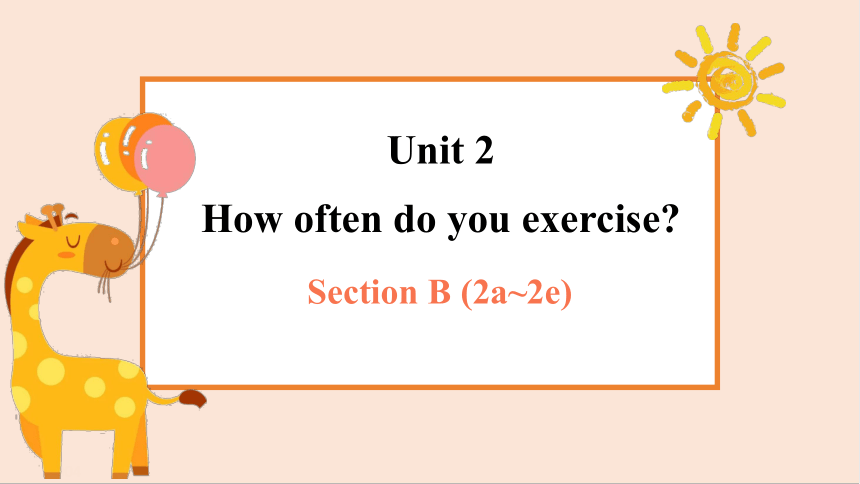
|
|
| 格式 | pptx | ||
| 文件大小 | 15.8MB | ||
| 资源类型 | 教案 | ||
| 版本资源 | 人教新目标(Go for it)版 | ||
| 科目 | 英语 | ||
| 更新时间 | 2024-10-10 00:00:00 | ||
图片预览

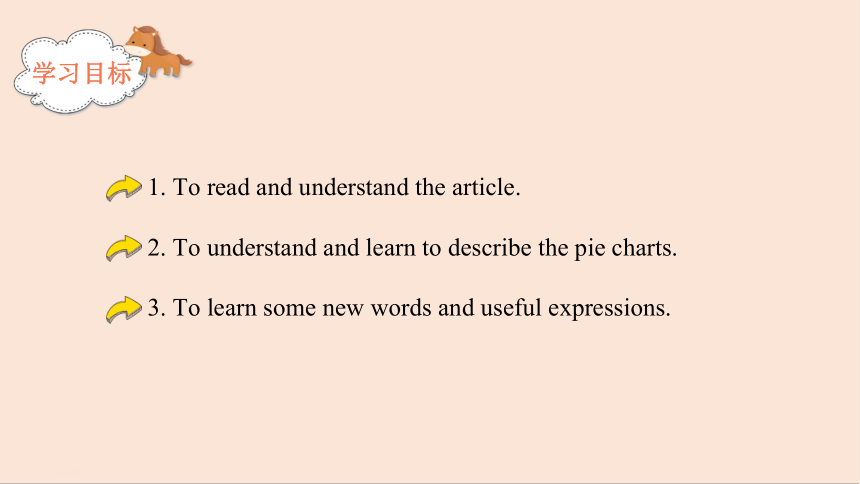
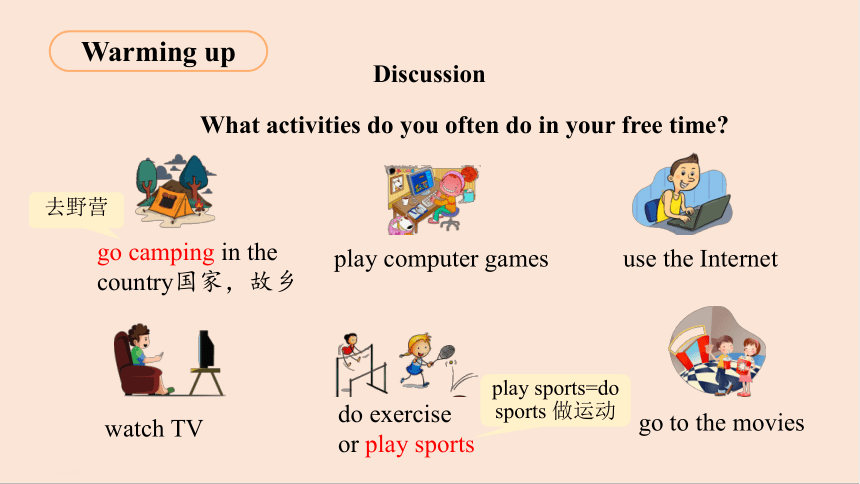

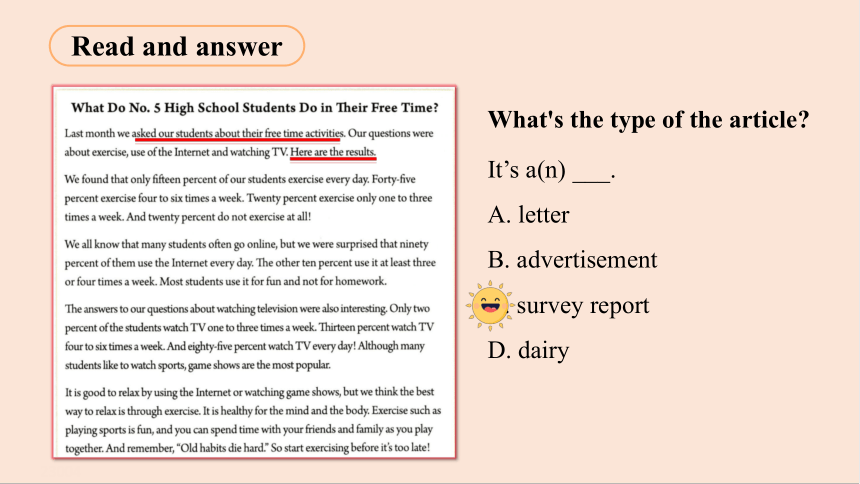
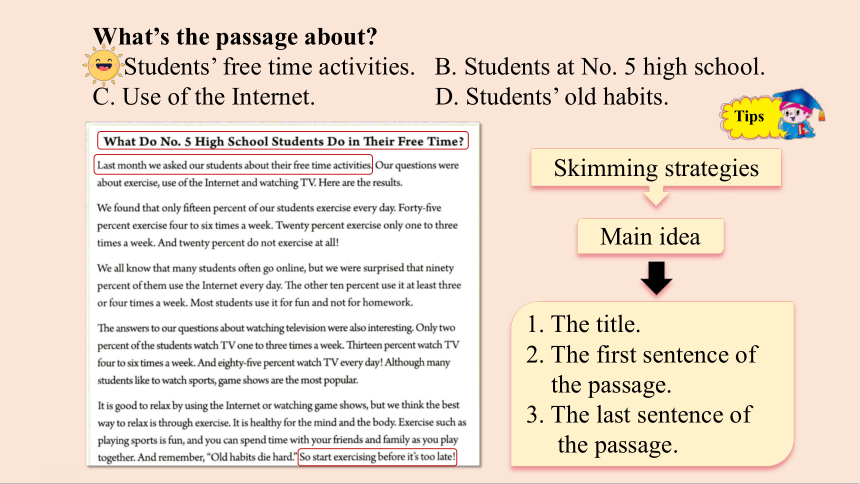
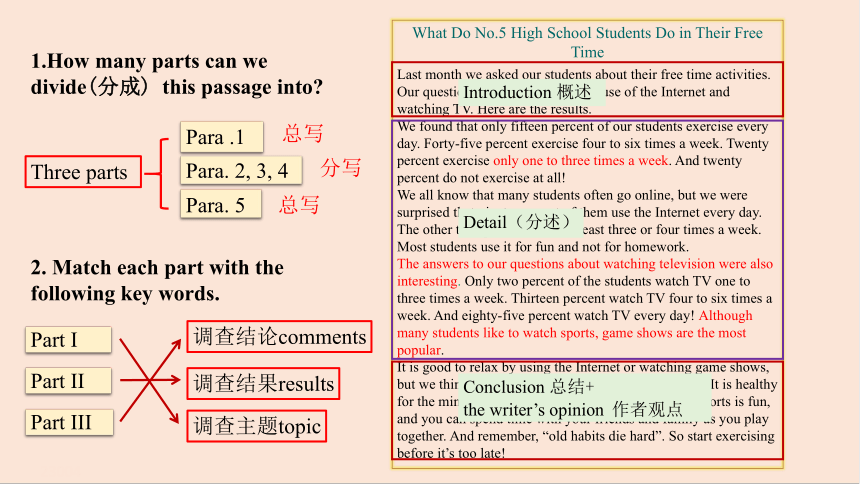
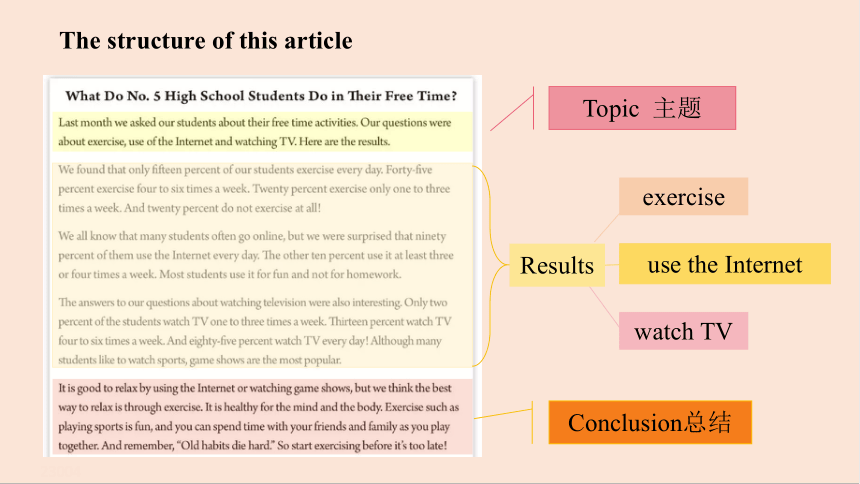
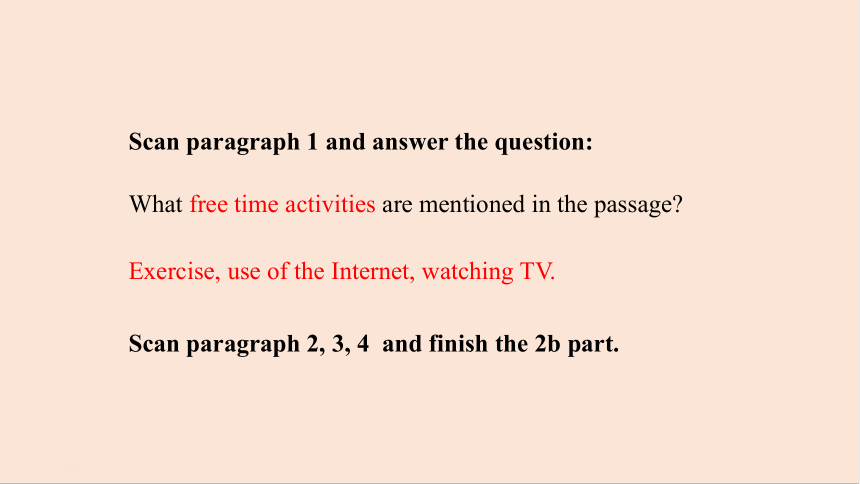
文档简介
(共24张PPT)
Section B (2a~2e)
Unit 2
How often do you exercise
1. To read and understand the article.
2. To understand and learn to describe the pie charts.
3. To learn some new words and useful expressions.
学习目标
go camping in the country国家,故乡
watch TV
do exercise or play sports
go to the movies
play sports=do sports 做运动
What activities do you often do in your free time
play computer games
use the Internet
去野营
Discussion
Warming up
What do No. 5 High School Students do in their free time
It’s a(n) ___.
A. letter
B. advertisement
C. survey report
D. dairy
What's the type of the article
Read and answer
What’s the passage about
A. Students’ free time activities. B. Students at No. 5 high school.
C. Use of the Internet. D. Students’ old habits.
Skimming strategies
Main idea
1. The title.
2. The first sentence of
the passage.
3. The last sentence of
the passage.
Tips
1.How many parts can we
divide(分成) this passage into
2. Match each part with the following key words.
What Do No.5 High School Students Do in Their Free Time
Last month we asked our students about their free time activities. Our questions were about exercise, use of the Internet and watching TV. Here are the results.
We found that only fifteen percent of our students exercise every day. Forty-five percent exercise four to six times a week. Twenty percent exercise only one to three times a week. And twenty percent do not exercise at all!
We all know that many students often go online, but we were surprised that ninety percent of them use the Internet every day. The other then percent use it at least three or four times a week. Most students use it for fun and not for homework.
The answers to our questions about watching television were also interesting. Only two percent of the students watch TV one to three times a week. Thirteen percent watch TV four to six times a week. And eighty-five percent watch TV every day! Although many students like to watch sports, game shows are the most popular.
It is good to relax by using the Internet or watching game shows, but we think the best way to relax is through exercise. It is healthy for the mind and the body. Exercise such as playing sports is fun, and you can spend time with your friends and family as you play together. And remember, “old habits die hard”. So start exercising before it’s too late!
Para .1
Para. 2, 3, 4
Para. 5
Three parts
总写
分写
总写
Part I
Part II
Part III
调查结论comments
调查结果results
调查主题topic
Introduction 概述
Detail(分述)
Conclusion 总结+
the writer’s opinion 作者观点
The structure of this article
Topic 主题
Conclusion总结
use the Internet
watch TV
Results
exercise
Scan paragraph 1 and answer the question:
What free time activities are mentioned in the passage
Scan paragraph 2, 3, 4 and finish the 2b part.
Exercise, use of the Internet, watching TV.
Read the article and complete the pie charts.
15
20
20
45
10
90
13
2
85
Exercise Use the Internet Watch TV
2b
Conclusion 调查结论
It is good to relax by using the Internet or watching game shows, but we think the best way to relax is through exercise. It is healthy for the mind and the body. Exercise such as playing sports is fun, and you can spend time with your friends and family as you play together. And remember, “old habits die hard”. So start exercising before it’s too late!
What does the writer think is the best way to relax Why
Exercise
It’s healthy for the mind and the body.
We can spend time with your friends and family as you play together.
It’s fun.
Para.5
1. 90%: Ninety percent of the students always use the Internet.
2. 85%: ___________________________________________
3. 45%: ___________________________________________
4. 10%: ___________________________________________
5. 13%: ___________________________________________
6. 2% : ___________________________________________
According to the article and the pie charts, write sentences with the percentages using always, usually or sometimes.
Eighty-five percent of the students always watch TV.
Forty-five percent of the students usually exercise.
Ten percent of the students often use the Internet.
Thirteen percent of the students usually watch TV.
Two percent of the students sometimes watch TV.
Do you think the students at No.5 high school are healthy Why or why not
2d
What Do No.5 High School Students Do in Their Free Time
Last month we asked our students about their free time activities. Our questions were about exercise, use of the Internet and watching TV. Here are results.
We found that only fifteen percent of our students exercise every day. Forty-five percent exercise four to six times a week. Twenty percent exercise only one to three times a week. And twenty percent do not exercise at all!
We all know that many students often go online, but we were surprised that ninety percent of them use the Internet every day. The other ten percent use it at least three or four times a week. Most students use it for fun and not for homework.
The answers to our questions about watching television were also interesting. Only two percent of the students watch TV one to three times a week. Thirteen percent watch TV four to six times a week. And eighty-five percent watch TV every day! Although many students like to watch sports, game shows are the most popular.
It is good to relax by using the Internet or watching game shows, but we think the best way to relax is through exercise. It is healthy for the mind and the body. Exercise such as playing sports is fun, and you can spend time with your friends and family as you play together. And remember, “Old habits die hard.” So start exercising before it's too late.
in one's free time
在某人的空闲时间里
asked our students about
ask (sb.) about sth. 询问某人关于某事
ask (sb.) for sth. 请求(某人)给予某物
ask sb. sth. 问某人某事
ask sb. (not) to do sth. 让某人(不要)做某事
use of the Internet
因特网的使用, use此处为名词
Here are results.
以 here, there, out, up, down 等副词开头的句子常用倒装结构。句子结构为:副词 + 谓语动词 + 主语(名词)。
eg.Here is my book. 这是我的书。
注意:here / there 位于句首时,若句子主语为人称代词,不用倒装。
Here he comes. 他来了。
here 引导的倒装句
Language Points
percent
n. 百分之…
not... at all
表强烈的否定,如果谓语动词是实义动词,放在not后,如果是be动词,放在not前。
一点也不
基数词 + percent of the … …的百分之…
注意:作主语时,单复数根据名词的词性决定。
e.g. 我们班里80%的学生每天都锻炼。
Eighty percent of the students in our class exercise every day.
e.g. 那个故事一点也没有趣。
The story isn’t interesting at all.
Language Points
online
adj. & adv. 在线(的);联网(的)
(1) online在此作副词,意为“在线;联网”。
eg. It is faster if you apply online.
eg. We plan to build an online database.
(2) online还可作形容词,意为“在线的;联网的”。
eg. Online shopping is both cheap and convenient, so many people like shopping online.
Language Points
be surprised that + 从句
因……而惊讶
the other
两者中的另一个(的)
eg. There are two apples here,one is red,the other one is a little green.
eg. I’m surprised that he came here in time.
知识拓展:be surprised at sth 对某事感到惊讶
eg. We are very surprised at the news.
be surprised to do sth 做某事而感到惊讶
eg. They were surprised to meet him.
Language Points
the answers to...
“......”的答案
although
“虽然;尽管”
注意:answer后要用介词to,这是一种固定的搭配
e.g. Her answer to your question is big “NO”!
她对你所提出问题的答案回答就是一个大大的“不”字!
注意:although是不和but在同一个句子中使用的。
eg. Although the car is old, it still runs well.
(=The car is old, but it still runs well.)
Language Points
It is adj. (+for sb.) to do sth.
it为形式主语,指代后面的to do
by 介词 “通过”
注意:answer后要用介词to,这是一种固定的搭配
by+v.-ing
by+抽象名词 by mistake 失错
by+交通工具 by car/bus/train/taxi/plane…
eg. They relax by watching TV .
e.g. It is important for us to learn English well.
It is good for our health to eat more vegetables.
Language Points
through
介词,“以,凭借”
such as+ n./v.-ing
注意:answer后要用介词to,这是一种固定的搭配
e.g. 他通过报纸上的一个广告找到这份工作。
He found the job through an advertisement in the newspaper.
through还有“穿过”之意。表示“从……内部过”。
e.g. 昨天他们穿过了森林。
They went through the forest yesterday.
例如;像......这样”
such as和for example都有“例如”之意。但________ 用来列举同类人或物中的几个例子,而____________用来列举同类人或物中的一个例子。
such as
for example
Language Points
spend
v. 度过;花费
e.g. On weekends, my brother and I often spend time on the beach.
e.g. I spent 150 yuan on this pair of shoes.
spend在此作及物动词,意为“度过”。此外,spend还可表示“花费(时间、金钱)”,此时常用于以下结构:
sb. spend(s) time on sth. /(in)doing sth.某人花费时间在某物上/做某事
sb. spend(s) money on sth. /on doing sth. 某人花费金钱在某物上/做某事
e.g. Stephen Hawking spent his whole life understanding the universe.
Language Points
Old habits die hard.
旧习难改
谚语,用来说明习惯一旦养成,并非朝夕可以改变,其中,die hard表示“(旧习惯、传统等)难以改变;根深蒂固”。在本句中,hard用作副词,表示“费力地;艰难地;努力地”
e.g.The famous singer died at the age of thirty-two.
e.g.The grass has been dead for more than ten days.
die常用作不及物动词,其后不能直接跟宾语,且die是短暂性动词,不能与表示一段时间的状语连用。如果表示状态,与一段时间连用,要用be dead。
death n.死亡
【拓展延伸】
die v. 死亡
dead adj. 死的
dying adj. 垂死的
Language Points
...before it's too late
...不要等到来不及了
it's too late的字面意思是“为时太晚;来不及了”,是英语中的一个常用表达。
e.g. Now you know you're wrong, but it's too late.
此处it's too late与before共同组成从句,表示“不要等到为时已晚;不要等到来不及的时候;趁着还来得及”。
e.g. You should work harder before it's too late to catch up.
你应当更加努力,别等到为时过晚而赶不上了。
(你现在用功还赶得上。)
Language Points
1.在空闲时间
2.询问某人关于某事
3.因特网的使用
4.每周四至六次
5.上网
6.百分之……的学生
7.至少
8.问题的答案
9.看电视
10.通过做某事
11.做某事的最好方式
12.例如;像……这样
13.旧习难改
in the free time
ask sb. about sth.
use of the Internet
four to six times a week
go online / use the Internet
... percent of the students
at least
the answers to the question
watch television
by doing sth.
the best way to do sth.
such as
Old habits die hard.
Summary
Section B (2a~2e)
Unit 2
How often do you exercise
1. To read and understand the article.
2. To understand and learn to describe the pie charts.
3. To learn some new words and useful expressions.
学习目标
go camping in the country国家,故乡
watch TV
do exercise or play sports
go to the movies
play sports=do sports 做运动
What activities do you often do in your free time
play computer games
use the Internet
去野营
Discussion
Warming up
What do No. 5 High School Students do in their free time
It’s a(n) ___.
A. letter
B. advertisement
C. survey report
D. dairy
What's the type of the article
Read and answer
What’s the passage about
A. Students’ free time activities. B. Students at No. 5 high school.
C. Use of the Internet. D. Students’ old habits.
Skimming strategies
Main idea
1. The title.
2. The first sentence of
the passage.
3. The last sentence of
the passage.
Tips
1.How many parts can we
divide(分成) this passage into
2. Match each part with the following key words.
What Do No.5 High School Students Do in Their Free Time
Last month we asked our students about their free time activities. Our questions were about exercise, use of the Internet and watching TV. Here are the results.
We found that only fifteen percent of our students exercise every day. Forty-five percent exercise four to six times a week. Twenty percent exercise only one to three times a week. And twenty percent do not exercise at all!
We all know that many students often go online, but we were surprised that ninety percent of them use the Internet every day. The other then percent use it at least three or four times a week. Most students use it for fun and not for homework.
The answers to our questions about watching television were also interesting. Only two percent of the students watch TV one to three times a week. Thirteen percent watch TV four to six times a week. And eighty-five percent watch TV every day! Although many students like to watch sports, game shows are the most popular.
It is good to relax by using the Internet or watching game shows, but we think the best way to relax is through exercise. It is healthy for the mind and the body. Exercise such as playing sports is fun, and you can spend time with your friends and family as you play together. And remember, “old habits die hard”. So start exercising before it’s too late!
Para .1
Para. 2, 3, 4
Para. 5
Three parts
总写
分写
总写
Part I
Part II
Part III
调查结论comments
调查结果results
调查主题topic
Introduction 概述
Detail(分述)
Conclusion 总结+
the writer’s opinion 作者观点
The structure of this article
Topic 主题
Conclusion总结
use the Internet
watch TV
Results
exercise
Scan paragraph 1 and answer the question:
What free time activities are mentioned in the passage
Scan paragraph 2, 3, 4 and finish the 2b part.
Exercise, use of the Internet, watching TV.
Read the article and complete the pie charts.
15
20
20
45
10
90
13
2
85
Exercise Use the Internet Watch TV
2b
Conclusion 调查结论
It is good to relax by using the Internet or watching game shows, but we think the best way to relax is through exercise. It is healthy for the mind and the body. Exercise such as playing sports is fun, and you can spend time with your friends and family as you play together. And remember, “old habits die hard”. So start exercising before it’s too late!
What does the writer think is the best way to relax Why
Exercise
It’s healthy for the mind and the body.
We can spend time with your friends and family as you play together.
It’s fun.
Para.5
1. 90%: Ninety percent of the students always use the Internet.
2. 85%: ___________________________________________
3. 45%: ___________________________________________
4. 10%: ___________________________________________
5. 13%: ___________________________________________
6. 2% : ___________________________________________
According to the article and the pie charts, write sentences with the percentages using always, usually or sometimes.
Eighty-five percent of the students always watch TV.
Forty-five percent of the students usually exercise.
Ten percent of the students often use the Internet.
Thirteen percent of the students usually watch TV.
Two percent of the students sometimes watch TV.
Do you think the students at No.5 high school are healthy Why or why not
2d
What Do No.5 High School Students Do in Their Free Time
Last month we asked our students about their free time activities. Our questions were about exercise, use of the Internet and watching TV. Here are results.
We found that only fifteen percent of our students exercise every day. Forty-five percent exercise four to six times a week. Twenty percent exercise only one to three times a week. And twenty percent do not exercise at all!
We all know that many students often go online, but we were surprised that ninety percent of them use the Internet every day. The other ten percent use it at least three or four times a week. Most students use it for fun and not for homework.
The answers to our questions about watching television were also interesting. Only two percent of the students watch TV one to three times a week. Thirteen percent watch TV four to six times a week. And eighty-five percent watch TV every day! Although many students like to watch sports, game shows are the most popular.
It is good to relax by using the Internet or watching game shows, but we think the best way to relax is through exercise. It is healthy for the mind and the body. Exercise such as playing sports is fun, and you can spend time with your friends and family as you play together. And remember, “Old habits die hard.” So start exercising before it's too late.
in one's free time
在某人的空闲时间里
asked our students about
ask (sb.) about sth. 询问某人关于某事
ask (sb.) for sth. 请求(某人)给予某物
ask sb. sth. 问某人某事
ask sb. (not) to do sth. 让某人(不要)做某事
use of the Internet
因特网的使用, use此处为名词
Here are results.
以 here, there, out, up, down 等副词开头的句子常用倒装结构。句子结构为:副词 + 谓语动词 + 主语(名词)。
eg.Here is my book. 这是我的书。
注意:here / there 位于句首时,若句子主语为人称代词,不用倒装。
Here he comes. 他来了。
here 引导的倒装句
Language Points
percent
n. 百分之…
not... at all
表强烈的否定,如果谓语动词是实义动词,放在not后,如果是be动词,放在not前。
一点也不
基数词 + percent of the … …的百分之…
注意:作主语时,单复数根据名词的词性决定。
e.g. 我们班里80%的学生每天都锻炼。
Eighty percent of the students in our class exercise every day.
e.g. 那个故事一点也没有趣。
The story isn’t interesting at all.
Language Points
online
adj. & adv. 在线(的);联网(的)
(1) online在此作副词,意为“在线;联网”。
eg. It is faster if you apply online.
eg. We plan to build an online database.
(2) online还可作形容词,意为“在线的;联网的”。
eg. Online shopping is both cheap and convenient, so many people like shopping online.
Language Points
be surprised that + 从句
因……而惊讶
the other
两者中的另一个(的)
eg. There are two apples here,one is red,the other one is a little green.
eg. I’m surprised that he came here in time.
知识拓展:be surprised at sth 对某事感到惊讶
eg. We are very surprised at the news.
be surprised to do sth 做某事而感到惊讶
eg. They were surprised to meet him.
Language Points
the answers to...
“......”的答案
although
“虽然;尽管”
注意:answer后要用介词to,这是一种固定的搭配
e.g. Her answer to your question is big “NO”!
她对你所提出问题的答案回答就是一个大大的“不”字!
注意:although是不和but在同一个句子中使用的。
eg. Although the car is old, it still runs well.
(=The car is old, but it still runs well.)
Language Points
It is adj. (+for sb.) to do sth.
it为形式主语,指代后面的to do
by 介词 “通过”
注意:answer后要用介词to,这是一种固定的搭配
by+v.-ing
by+抽象名词 by mistake 失错
by+交通工具 by car/bus/train/taxi/plane…
eg. They relax by watching TV .
e.g. It is important for us to learn English well.
It is good for our health to eat more vegetables.
Language Points
through
介词,“以,凭借”
such as+ n./v.-ing
注意:answer后要用介词to,这是一种固定的搭配
e.g. 他通过报纸上的一个广告找到这份工作。
He found the job through an advertisement in the newspaper.
through还有“穿过”之意。表示“从……内部过”。
e.g. 昨天他们穿过了森林。
They went through the forest yesterday.
例如;像......这样”
such as和for example都有“例如”之意。但________ 用来列举同类人或物中的几个例子,而____________用来列举同类人或物中的一个例子。
such as
for example
Language Points
spend
v. 度过;花费
e.g. On weekends, my brother and I often spend time on the beach.
e.g. I spent 150 yuan on this pair of shoes.
spend在此作及物动词,意为“度过”。此外,spend还可表示“花费(时间、金钱)”,此时常用于以下结构:
sb. spend(s) time on sth. /(in)doing sth.某人花费时间在某物上/做某事
sb. spend(s) money on sth. /on doing sth. 某人花费金钱在某物上/做某事
e.g. Stephen Hawking spent his whole life understanding the universe.
Language Points
Old habits die hard.
旧习难改
谚语,用来说明习惯一旦养成,并非朝夕可以改变,其中,die hard表示“(旧习惯、传统等)难以改变;根深蒂固”。在本句中,hard用作副词,表示“费力地;艰难地;努力地”
e.g.The famous singer died at the age of thirty-two.
e.g.The grass has been dead for more than ten days.
die常用作不及物动词,其后不能直接跟宾语,且die是短暂性动词,不能与表示一段时间的状语连用。如果表示状态,与一段时间连用,要用be dead。
death n.死亡
【拓展延伸】
die v. 死亡
dead adj. 死的
dying adj. 垂死的
Language Points
...before it's too late
...不要等到来不及了
it's too late的字面意思是“为时太晚;来不及了”,是英语中的一个常用表达。
e.g. Now you know you're wrong, but it's too late.
此处it's too late与before共同组成从句,表示“不要等到为时已晚;不要等到来不及的时候;趁着还来得及”。
e.g. You should work harder before it's too late to catch up.
你应当更加努力,别等到为时过晚而赶不上了。
(你现在用功还赶得上。)
Language Points
1.在空闲时间
2.询问某人关于某事
3.因特网的使用
4.每周四至六次
5.上网
6.百分之……的学生
7.至少
8.问题的答案
9.看电视
10.通过做某事
11.做某事的最好方式
12.例如;像……这样
13.旧习难改
in the free time
ask sb. about sth.
use of the Internet
four to six times a week
go online / use the Internet
... percent of the students
at least
the answers to the question
watch television
by doing sth.
the best way to do sth.
such as
Old habits die hard.
Summary
同课章节目录
- Unit 1 Where did you go on vacation?
- Section A
- Section B
- Unit 2 How often do you exercise?
- Section A
- Section B
- Unit 3 I'm more outgoing than my sister.
- Section A
- Section B
- Unit 4 What's the best movie theater?
- Section A
- Section B
- Unit 5 Do you want to watch a game show?
- Section A
- Section B
- Unit 6 I'm going to study computer science.
- Section A
- Section B
- Unit 7 Will people have robots?
- Section A
- Section B
- Unit 8 How do you make a banana milk shake?
- Section A
- Section B
- Unit 9 Can you come to my party?
- Section A
- Section B
- Unit 10 If you go to the party, you'll have a grea
- Section A
- Section B
